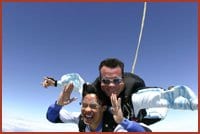Kneeling at theedge of the white, DASH-6 Twin Otter plane’s doorway, my reactions are slow and my movements heavy. Wind speeds at 13,500 feet can reach about 50 knots (92 km/h). As the sound of the twin otter’s propellers thunder into the sky and the smell of jet fuel reaching my nostrils, I realize it’s the adrenaline rush that hooks people to skydiving. I struggle to hear my instructor’s words. My head tilts down. I see pockets of clouds and patches of earth below. Far, far below. My instructor tilts my chin up. It’s too much for me. I scream, “OH MY GOD!” No one can hear me.
Down I go, head first. Then a back flip followed by a sideway turn. Time slows. It doesn’t feel like a 200 km/h freefall. It’s so dizzying. It’s so surreal. For a few seconds, I just fall away from the airplane. I don’t breathe. I close my eyes as gravity pulls me down.
***
An hour earlier, I was driving south on Highway 10 toward NouvelAir, a skydiving drop zone 30 minutes outside Montreal. The sky didn’t look good. Grey clouds blanketed my journey to Farnham airport. For the past 72 hours, rain and high winds had prevented me from jumping from a plane. Until today.
As I arrive at 1pm, the temperature rises and the clouds dissipate. Just like that. The sun asserts itself between the scattered clouds. Grey clouds turn to white, fluffy ones. This was meant to happen today.
Walking on the rock-paved road to the administration office, I feel the tightening that comes when fear and excitement combine. Like an important date.
***
I open my eyes. For a second, just a second, I forget where I am. And then I remember: I’m at 4,000 metres, looking at the earth far below. Time stops. I open my mouth. Wrong move. My whole face ripples like a flag in heavy wind. My mouth soon dries up.
And then, just like a hawk eyeing its prey, I spread my winds majestically towards the horizon. Without any helmet, without anything holding me up, just me and my clear plastic goggles and grey suit with black and blue stripes, I face the world. Head on. And oh, I feel so strong and free and powerful.
Below, still distant, I see patches of brown and green rectangles and miniature lakes, all of it arranged like a quilt — the rural countryside of southern Quebec is so small. Looking straight ahead, I see the horizon. The earth and the atmosphere intertwine, but the line is blurred. Around me I don’t see the other first-time jumpers I befriended earlier. I’m now alone befriending the sky and trying to understand the magnitude of space surrounding me. Anything could happen at this moment.
***
At the administration office, I’m handed a waiver to sign. Death is always a possibility when you jump out of planes, no matter how good the equipment or how experienced the instructor. You deal with that before you decide to try parachuting. But it’s quite another thing to read the word “death” four times in a waiver; it’s hard to swallow and I realize that I’m holding my breath as I read the form.
I sign.
I watch a 15-minute video in the briefing room. Instructor Eric Bédard, a six-foot-man with piercing blue eyes, calms me as he answers my questions as best as he can.
How many times does he jump a year? Up to 15 jumps a day if the weather is good.
How strong are the metal hooks that will hold me to him throughout the jump? They’ll hold 1,000 lbs.
How long has he been doing this. Ten years.
He tells me my worries are normal for a first-time jumper. I feel safer knowing he’s going to be right behind me, strapped in tight.
***
Eric taps me on my left shoulder. I know from the video what to do: one tap, cross my arms. Another tap, uncross my arms and spread them. Tap again: cross them once more.
I cross my arms at 5,000 feet. Eric releases the parachute behind him and I’m pulled back. I hold onto the harness connecting me to him. Winds at this altitude are less harsh than during the freefall. Both my fear and excitement has dulled and I’m now just awestruck by the beauty of where I’m heading — into a cloud the size of a three-storey building. A question that’s stayed with me from childhood is finally answered. Just like at the beginning of the movie Mary Poppins, I’m above a cloud and heading toward its fluffy white heart.
As it embraces me, I feel small particles delicately touching my exposed face. Then all is white for a few seconds until the rural landscape suddenly reappears.
Eric allows me to hold the steering ropes. Controlling the direction of our descent is not difficult. I’m sure I could jump alone next time around.
For a few minutes, I’m suspended on two ropes and kept safe by a few metres of nylon parachute. As I reach the ground, I think of a hawk’s feet reaching with precision to grab its prey. I land on the ground, feeling triumphant.
And to my surprise, I’ve learned something from this experience. It’s rational to be afraid of jumping from planes. But there’s a great feeling of fulfillment in preparing for the danger and then overcoming that fear and facing another. I’ve learned to face down whatever fears life throws at me.

 Why you can trust Xtra
Why you can trust Xtra


